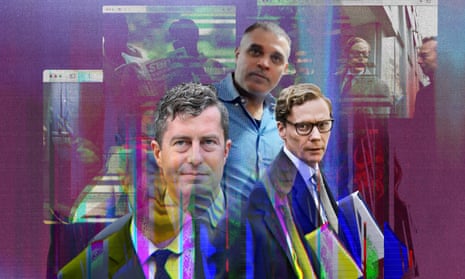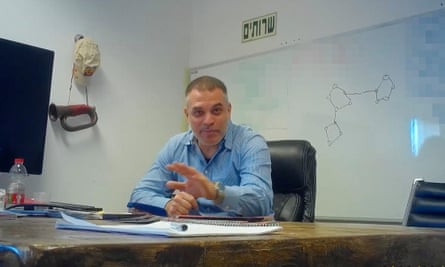Revealed: the US adviser who tried to swing Nigeria’s 2015 election
Sam Patten, an American consultant later mired in controversy, exploited emails obtained by Tal Hanan’s team

I
For Alexander Nix, the Etonian chief executive of Cambridge Analytica, and his new employee Brittany Kaiser, who networked like most other people breathed, there may have been nothing unusual about such a gathering.
But, by any other measure, it was an unlikely ensemble, not least because last week the identity of the intelligence operative was revealed to be Tal Hanan: an Israeli “black ops” mercenary who, it is now known, claims to have manipulated elections around the world.
Hanan, who operates using the alias “Jorge”, has boasted of meddling in more than 30 elections. His connection to the now defunct Cambridge Analytica offers a revealing insight into what appears to have been a decades-long global election subversion industry.
Hanan’s group, “Team Jorge”, was unmasked by an international consortium of media, including the Guardian and Observer, which revealed the hacking and disinformation tactics it uses to try to sway elections.
Three reporters in Israel went undercover, pretending to be consultants trying to delay an election in a politically unstable African country. They secretly filmed more than six hours of Team Jorge’s pitches, including a live demonstration by Hanan showing how he could use hacking techniques to access the Telegram and Gmail accounts of senior political figures in Kenya. Hanan did not respond to detailed requests for comment but said: “To be clear, I deny any wrongdoing.”
Previously unpublished emails leaked to the Observer and Guardian proved that Hanan had interfered in the 2015 Nigerian presidential election, in an attempt to bolster the electoral prospects of then incumbent president Goodluck Jonathan – and discredit Muhammadu Buhari, his main rival. And he did it in coordination with Cambridge Analytica.
There is no suggestion that Jonathan knew of either Cambridge Analytica or Team Jorge’s ultimately failed attempts to get him re-elected. And the campaign had nothing to do with the hack of Facebook data that propelled the company into the headlines in 2018.
Instead, its most salient feature was a classic dirty tricks campaign. Team Jorge obtained documents from inside the opposition campaign of Buhari that could later be leaked to the media. Cambridge Analytica did the leaking.
That episode has been drawn sharply into focus in recent days. But one name so far not mentioned has been that of Sam Patten, the consultant who managed Cambridge Analytica’s campaign on the ground in Nigeria. Three years later, Patten would come to be known as a cooperating witness in Robert Mueller’s special counsel investigation into Russian interference in the 2016 US election.
A former state department official, Patten was ultimately charged and pleaded guilty to acting as an unregistered foreign agent to a Ukrainian oligarch. And among a memorable cast of characters who wound up as part of Mueller’s investigation, Patten’s business partner, Konstantin Kilimnik, stood out: he was a Russian spy.
A spy who allegedly passed polling data – processed by Cambridge Analytica – from the Trump campaign to Russian intelligence in 2016 and planted false narratives about Ukraine in the 2020 election. Kilimnik was later subjected to sanctions by the US Treasury, which described him as a “known Russian intelligence services agent implementing influence operations on their behalf”. He has denied that he worked for Russian intelligence.

A campaign so dirty it panicked staff
Close readers of the Observer may fuzzily recall some elements of this story from our coverage of the Cambridge Analytica scandal in 2018. In the news frenzy that followed the Observer and New York Times revelations about the illicit (and now known to be illegal) heist of millions of people’s Facebook data, one story got lost in the mix.
Four days after the original report in the Observer, we published a series of follow-up stories in the Guardian about a campaign so dirty that, even at the time, employees worried that they were implicated in illegal activity. This was the Nigeria campaign that resurfaced this week, with the unmasking of Hanan finally solving the mystery of the identity of the “Israeli consultants” referenced in the story.
In 2018, some employees knew Hanan as “Jorge” but his true identity was unknown. Kaiser, grilled by MPs in parliament, said she could not “recall” his name, and she did not know about his activities until after the event.
Emails leaked to the Guardian and Observer reveal when Nix asked her the real name of “Jorge” from “the Israel black ops co” in May 2015, she replied: “Tal Hanan is CEO of Demoman International.”
Kaiser told the Observer that her parliamentary testimony had been a “daunting experience”, adding: “I didn’t remember the name of the Demoman company when asked.” She said she had no prior knowledge of the methods Team Jorge would end up using in Nigeria, and downplayed her role in the campaign.
Cambridge Analytica and Team Jorge were, she said, working “separately but in parallel” for the same client – the Nigerian businessman both sides had met during the gathering in Madrid. “Alexander flew in for this one to pitch the Nigerians and separately so did Jorge,” Kaiser recalled.
After the Madrid meeting, Kaiser said, she was not involved in any “operational matters with Jorge” in relation to the Nigeria campaign, which was led by a team on the ground. “I sent some emails to put everyone in contact with each other and sort out who was doing what as time was short,” she added.
The emails suggest that Patten would, as part of his role at Cambridge Analytica, take responsibility for exploiting the material that Hanan obtained from the Nigerian opposition. Despite anxiety over the material, which panicked staff had assumed had been “hacked”, someone at Cambridge Analytica combed through the documents, looking for dirt on the opposition candidates.
And it was Patten who appears to have leaked select documents to BuzzFeed and the Washington Free Beacon.
‘Ghost’ campaign in Nigeria
In January 2015, Patten found himself parachuted into Abuja, Nigeria, to lead a last-minute $1.8m “ghost” campaign for SCL (Cambridge Analytica) in support of President Jonathan and against Buhari. Kaiser had helped land the contract in her first weeks with the company.
In her memoir, Targeted, she writes that it was her friend, a former Libyan prince, who introduced her to “wealthy Nigerian oil industry billionaires” who wanted a last-minute anonymous campaign to help get Jonathan re-elected.
Emails obtained by the Observer show that Kaiser’s travel schedule in December 2014, when she was helping seal the contract, was a whirlwind of meetings across three continents with highly placed contacts and a complicated web of different, though often overlapping, projects.
One was the last-minute attempt to affect the outcome of the west African election. While the wealthy Nigerian client hired Cambridge Analytica and Team Jorge on separate contracts, the expectation was that both sides would coordinate.
Within a fortnight of the Madrid meeting, Patten flew into Abuja. He is understood to have coordinated with others in the country against Buhari – among them Hanan, who sources say he met in a hotel in Abuja. Another Team Jorge operative working in Nigeria did so under the alias “Joel”.
Hanan claimed in emails that they had entered the country on a “special visa”. A highly placed source told the Observer in 2017 that the Israeli contractors travelled on Ukrainian passports and that their fee for work in Nigeria – $500,000 – was transmitted via Switzerland into a Ukrainian bank account.
A busy time for Sam Patten
In press reports, Patten has said he was not involved in Cambridge Analytica’s controversial data-targeting practices. The work he performed for the now defunct firm, he told New York magazine in 2019, was more “standard”, described as analysis, speechwriting, ads and “attempts to sway the media”.
But the consortium’s investigation and previous reporting by the Observer suggest a different story. It was a busy time for Patten, whose work in Nigeria took place days before he founded a new company – Begemot Ventures – with Konstantin Kilimnik, the Ukrainian-born political consultant alleged to be a Russian intelligence agent by the US government.
According to the emails, Patten flew to London at the end of January. That was where, according to the subject line of one email, a “final sweep” of the material that Team Jorge had obtained using deceptive measures was undertaken. There is no evidence that Patten knew about the nefarious methods through which that material had been obtained by the Israelis
But others at the firm were alarmed. Cambridge Analytica employees who worked in the company’s office in Mayfair, central London, told the Observer in 2018 how they had been given a thumb drive by two Israeli operatives, one of whom is now known to be Hanan. Employees described their panic when they realised they were looking at private emails that they assumed had been illegally hacked, with one said to have “freaked out”.

Kaiser told parliament that episode was “concerning”. But she said she did not believe the emails had been “hacked” in the classic sense, via computer, but by a person hired by the Israeli team to physically infiltrate the Buhari campaign and illicitly download them there.
Whatever the case, it was Cambridge Analytica’s job to search for dirt. We “continue to analyse the information that we received from Jorge to see if there is anything that would ignite the international press”, an employee told a representative of the client. “If we find something, then we will push it.”
Patten, it would appear, was focused on exactly that. The problem was that the data dump was disappointing. Referring to “the matter that brought us back to London”, Patten asked colleagues: “Did anyone come up with anything that could be of interest? My overall read is that, while a good insight into campaign thinking, there are few silver bullets or smoking guns.”
He added that he would “use the AKPD bits”. That was a reference to emails revealing that AKPD Message and Media, the political consultancy founded by David Axelrod, a former chief strategist to Barack Obama, had briefly been hired by the Buhari campaign.
“What are our media pitch angles?” Patten asked the next day, in an email enumerating three points, including that “B’s [Buhari’s] actual positions are obscured by a slick ‘change’ campaign steered by well-heeled American consultants”.
Hours later, he sent another email: “Boom. Story 1 in progress, background sources needed, off the record, who other than me can do?” He then sent another email to clarify that he needed someone on the team to speak to a journalist to tell them Buhari, the leader of the All Progressives Congress (APC), was “running a tight, American-style campaign with discipline and a scripted message”.
Five days later, an article appeared in BuzzFeed headlined “Firm founded by David Axelrod worked in Nigerian election as recently as December”. It referenced “emails between top APC officials obtained by BuzzFeed News”, which echoed Patten’s talking points.
On the same day, another article appeared in the Washington Free Beacon that also referenced the leaked emails. It cited “a series of emails” obtained by the conservative news website “between senior APC party members and advisers”.
BuzzFeed declined to comment. The Washington Free Beacon did not respond to a request for comment. When reached by phone, Patten said he had no recollection of a man named Tal Hanan or Jorge, and was “not involved” in anything having to do with the “Israeli hackers” who were previously the subject of media attention.
When asked whether he had ever contacted reporters to discuss AKPD working for Buhari, he paused. “I’m not going to get into that,” he said, before ending the conversation. He did not respond to further requests for comment. Nix did not respond to questions, other than to say this newspaper’s “purported understanding is disputed”.

